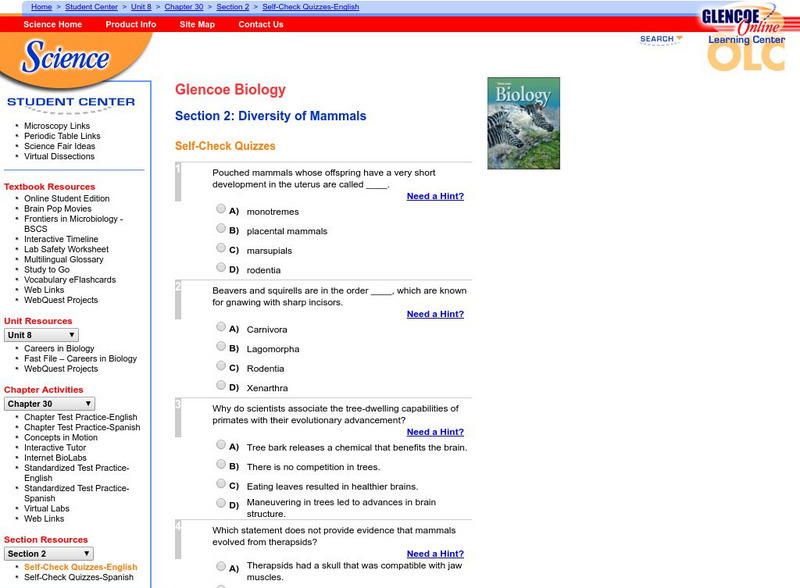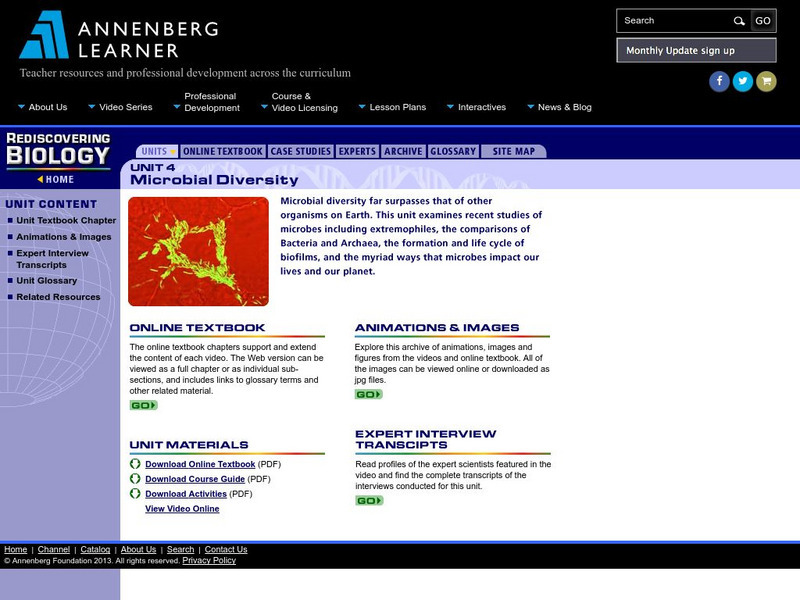Hi, what do you want to do?
Curated OER
Classification of Life
In this classification of life worksheet, students use an on line source to answer questions about how species are classified, named and grouped. They give the classification of a bear, an orchid and a sea cucumber.
Curated OER
Naming New Species
Students explore science of taxonomy and the Five Kingdoms of life,
categorize organisms into Kingdoms, and create multi-media presentations illustrating knowledge of a Kingdom. They collect data and related pictures on the Internet,...
Curated OER
the Wonder of Wetlands
Students explore the importance of the wetland ecosystem, its properties and functions, as well as, the many birds, animals, and plant life found there.
Curated OER
Building a Clay Neuron
Students investigate and then build neurons in this lesson. They are examined as key parts of the brain and nervous system and seen as different from normal cells.
Curated OER
California Biodiversity
Students examine several maps of California exhibiting features such as precipitation, topography, and vegetation. They look for patterns that might be the source of or influence biodiversity in different regions. They pay particular...
Curated OER
A Natural Habitat: What, How and Why
Students understand what a habitat is. They determine why a habitat is important to our environment no matter where it is located. Students observe and recognize natural habitats in their surroundings.
Curated OER
Cloning Animals and Plants: Any Difference?
Students examine the process in which plants and animals are cloned. They compare and contrast the two procedures and determine if there is a difference. They share their views on cloning to the class.
Curated OER
GM Foods: Are They Safe?
Learners examine the process for testing GM foods. They research benefits and hazards of a selection of GM foods. They also create images of new labels and marketing for GM foods.
Curated OER
Discovering New Species
Students identify animals observed by Lewis and Clark while evaluating the animal's habitat and describing the animal's behavior. Students construct a food web mobile to illustrate the animal's position in the food web in the 19th...
Curated OER
Cypress/Tupelo Swamps
Students study the geologic history of terrain, soils, and drainage patterns. They recognize ecological processes that determine the dynamic nature of habitats. They investigate the influence of human activity on the landscape.
Curated OER
Big Fleas Have Little Fleas!
Students study seamounts and learn the importance of structures to species. In this ocean explorer lesson, students participate in an activity that teaches them how to modify a seamount so that they are more suitable for species.
Curated OER
Saving Tropical Rainforests
In this rainforest worksheet, learners watch a video of Prince Charles wanting to save the tropical rainforest and then fill in the blanks to sentences about the video. Students complete 12 sentences.
Curated OER
Insect Biology and Ecology: A Primer
Students explore insects and closely related organisms. They examine the growth and development of a lady beetle. Students classify insects and organize them. They investigate pest management.
Curated OER
Communication in Bees
Eighth graders identify and interpret a scientific investigation and a hypothesis through experimentation and testing a hypothesis. They identify what scientists hypothesized about the communication of stingless bees. Finally, 8th...
Curated OER
SHOW 303: The Channel Island Fox
Students explore how archaeologists and other scientists use different clues to piece together a picture of the past. Students perform activities that allow them to conduct three types of scientific research. They discuss their...
Georgia Department of Education
Ga Virtual Learning: Ap Biology: Animals
This unit focuses on the unique structure and function of both invertebrate and vertebrate animals. Students review their understanding of animal diversity, and take a closer look at the various organ systems found in the animal kingdom.
Regents of the University of Michigan
Animal Diversity Web: Bombyx Mori (Silkworms)
Biological information about the silkworm, Bombyx mori, including habitat, physical description, behavior, food habits, and more.
McGraw Hill
Glencoe Biology: Animal Body Plans: Self Check Quiz
Try these five multiple-choice questions about animal body plans. After submitting answers, students can review the material.
CK-12 Foundation
Ck 12: Episd: Animal Classification
[Free Registration/Login may be required to access all resource tools.] Check out the diverse traits that animals can have that put them into different Phyla to make it easier to classify them.
McGraw Hill
Glencoe Biology: Diversity of Mammals: Self Check Quiz
Five multiple choice questions about the diversity among mammals. After submitting answers, students can review any missed material.
Annenberg Foundation
Annenberg Learner: Rediscovering Biology: Unit 4: Microbial Diversity
A complete learning module on microbial diversity that includes a downloadable textbook chapter, teacher guide, and lesson activities. The chapter can also be viewed online. In addition, there are animations, images, a video, and...
Curated OER
National Park Service: Mammoth Cave: Biology and Cave Life
This resource describes the biology and cave life of Mammoth Cave. Among the topics discussed are the animal and plant life associated with the area. Requires Adobe Reader. [PDF]
Georgia Department of Education
Ga Virtual Learning: Ap Biology: Chemistry of Life
Through informational text, interactive activities, animations, and video clips, students examine the chemistry of living things, and they learn how interactions from atoms are fundamental to life as we know it.
University of California
Ucmp: Introduction to Ctenophora
This is an advanced level review of the biology of these organisms. The opening photographs are worth seeing!




























